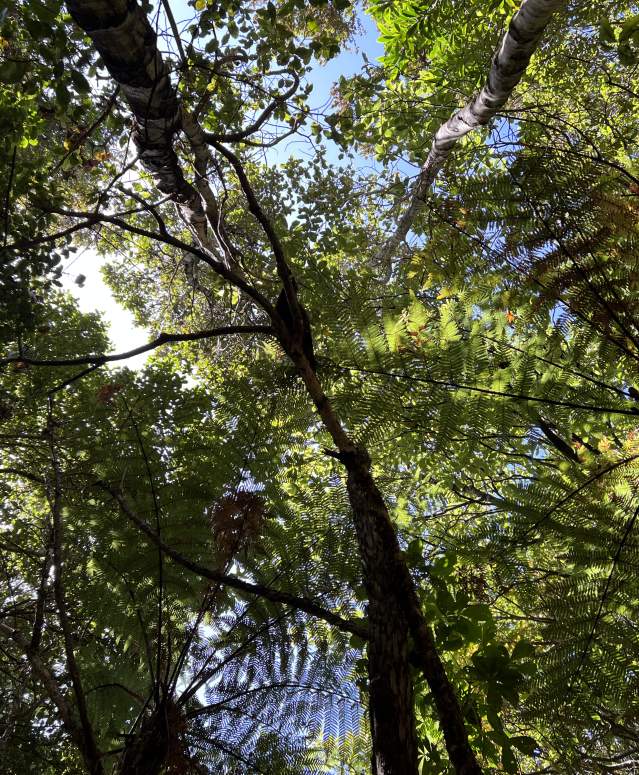Sustainability and Conservation
Kaitiakitanga Guardianship of Southland
Kaitiakitanga, a concept deeply rooted in Māori culture, plays a pivotal role in Murihiku Southland's approach to guardianship, sustainability, and conservation. In Southland, kaitiakitanga is not just a term but a way of life. It embodies the responsibility and stewardship of our land, waters, and natural resources. For generations, our local communities have embraced kaitiakitanga to ensure the long-term well-being of our cherished environment.
Conservation is a shared commitment here and reflected within our vibrant community of conservationists and volunteers. Around 60% of our land is protected as conservation estate and National Parks, and we are home to some of the most breath-taking and iconic wildlife and wild places in all of New Zealand, including large parts of Te Wāhipounamu. This UNESCO World Heritage area covers over 2.6 million hectares of southwest Aotearoa and encompasses Fiordland National Park. Through initiatives like predator control programs and habitat restoration projects, Murihiku Southland strives to safeguard its unique biodiversity. Our dedication to kaitiakitanga, sustainability, and conservation recognises the importance of preserving these natural treasures (taonga) for generations to come.
Sustainable Travel
Are you ready for an unforgettable adventure in Southland? Discover the region's stunning natural landscapes while supporting local communities and minimizing your impact on the environment with sustainable travel options…
Conservation Management
The Department of Conservation (DOC) is the government department entrusted with conserving New Zealand’s natural and historic heritage. DOC's initiatives encompass a wide range of activities, from managing national parks and reserves to implementing conservation programs tailored to the specific needs of our ecosystems. This involves habitat restoration, pest control, and species protection efforts aimed at safeguarding native flora and fauna.
Nationally there are also 14 conservation boards who represent their communities in the work of DOC and conservation in general. The Southland Conservation Board is active and passionate in their advocacy for the region. They work with various conservation organisations and members of the public, in areas of interest to Southland, within a fast-changing contemporary environment. The Conservation Boards’ quarterly newsletter is a great way to keep informed on their recent activities, subscribe and explore the archive.
Birdlife
Southland offers some of the best bird watching opportunities & bird sanctuaries in the country. Fiordland & Ulva Island are home to a variety of unusual species. Unique birds like kiwi, takahē & cheeky kea can be found…
Conservation Projects
In Murihiku Southland we don’t just talk the talk, we walk the walk. There are many sustainability and environmental initiatives in place within our communities. These are largely run by volunteers and local people with a passion for preserving our wildlife and natural environments, both for now and for generations to come. Many of our tourism businesses also support these programmes and are work actively with conservation projects. Direct support from visitors is also welcome.
Click on one of the names below to read more about these conservation projects and what they are working to achieve.
-
Established in 2008, the Bluff Hill Motopōhue Trust is dedicated to restoring and protecting the natural
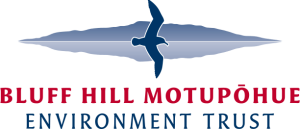
environment on and around Bluff Hill. They do this through pest control, habitat restoration, species translocation, and
public awareness raising. The Trust has a mixed volunteer and employee workforce governed by a volunteer Board of Trustees. They are advised by the Department of Conservation (DOC), Te Runanga O Awarua and Environment Southland. -
Te Roopu Manaaki o Whakatipu Waitai The Hollyford Conservation Trust was formed in June 2014 to establish a ‘mainland island’ sanctuary in the lower Hollyford Valley in partnership with the Department of Conservation (DOC) and other stakeholders. The project would involve 2600 hectares of intensive predator and pest control, targeting stoats, rats and possums, but stoat control has now been extended to a larger 12,000-ha project area.
 From 2016 on, the trust has worked to upgrade the trapping network, completed frequent trap checks, including responding to mast year events, conducted weed control, and reintroduced the previously locally extinct species, kakaruai South Island robin (April 2019). The trustees are constantly reviewing best pest and predator control practices and are working hard to raise the necessary funds to protect this treasured corner of Fiordland.
From 2016 on, the trust has worked to upgrade the trapping network, completed frequent trap checks, including responding to mast year events, conducted weed control, and reintroduced the previously locally extinct species, kakaruai South Island robin (April 2019). The trustees are constantly reviewing best pest and predator control practices and are working hard to raise the necessary funds to protect this treasured corner of Fiordland. -
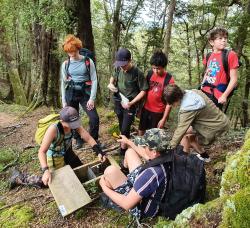 Kids Restore the Kepler is an award-winning project which engages schools, community, contractors and DOC in active stewardship of the Kepler Peninsula in Fiordland National Park. Combining conservation and education, the project mobilises local learning centres, businesses, council and community volunteers to help control pests and protect endangered native species.
Kids Restore the Kepler is an award-winning project which engages schools, community, contractors and DOC in active stewardship of the Kepler Peninsula in Fiordland National Park. Combining conservation and education, the project mobilises local learning centres, businesses, council and community volunteers to help control pests and protect endangered native species.Kids Restore the Kepler is actively involved in protecting 530 ha of native forest nested within the larger predator control area of nearly 3,000 ha.
-
Rakiura Stewart Island is an island of untouched landscapes, remote wilderness, and distinctive ecosystems.
Predator Free Rakiura is an ambitious project that aims to remove rats, possums, feral cats and hedgehogs from Rakiura Stewart Island and its islands.
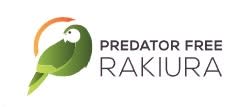
These predators eat or compete with wildlife, damage vegetation, and threaten the survival of our native species. Predator Free Rakiura is a non-profit alliance led by a collaboration of iwi, government, business, organisations, and community members. This alliance is referred to as the Predator Free Rakiura Leadership Group. Achieving this vision for New Zealand’s third largest island would be a significant step towards achieving a Predator Free New Zealand by 2050 and be the largest pest eradication of an inhabited island (based on land area and population). -
The South C
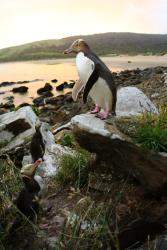 atlins Charitable Trust was formed in 2002 by the South Catlins community in order to preserve the areas incredible natural environment while catering to a growing number of visitors.
atlins Charitable Trust was formed in 2002 by the South Catlins community in order to preserve the areas incredible natural environment while catering to a growing number of visitors.
Since its inception the Trust has worked on key projects within Curio Bay including the reforestation of the Living Forest, development of walkways and restoration of the endangered yellow-eyed penguin habitat. As well as these efforts to conserve and protect the area they have made changes to improve the experience of the Bay for visitors and locals.Passionate about the Catlins and its wildlife, The Trust have a strong desire to share the unique history and story of the area with visitors. Tumu Toka Curioscape is the culmination of their vision. As kaitiaki or guardians of this place, they welcome you.
-
The Stewart Island / Rakiura Community & Environment Trust (SIRCET) is a non-profit organisation founded in 2003 to
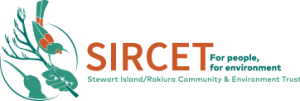
promote projects that benefit the Rakiura Stewart Island community and its environment. The focus is predominantly on ecological restoration through controlling pests and weeds, monitoring birds and re-vegetation work so native wildlife can thrive. With the support of volunteers and landowners, the Halfmoon Bay Habitat Restoration Project has grown to protect 210 hectares from Ackers Point to Golden Bay Road. -
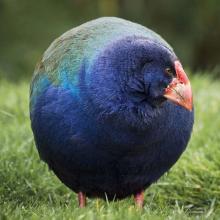 For more than 65 years, attempts to save takahē have pioneered conservation techniques for protected species in New Zealand and in the world. Today the work of a small, dedicated team of DOC takahē rangers is well supported and enhanced by iwi, scientists, volunteers, and the public and private organisations that provide safe homes and care for the growing breeding takahē and those birds now retired from the breeding programme.
For more than 65 years, attempts to save takahē have pioneered conservation techniques for protected species in New Zealand and in the world. Today the work of a small, dedicated team of DOC takahē rangers is well supported and enhanced by iwi, scientists, volunteers, and the public and private organisations that provide safe homes and care for the growing breeding takahē and those birds now retired from the breeding programme.
The Takahē Recovery Programme involves a network of people throughout Aotearoa New Zealand, working together to ensure the takahē is never again 'considered extinct'. -
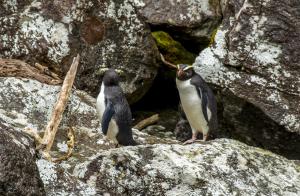 The Tawaki Project is a long-term study of the marine ecology, breeding biology and population dynamics of the world's least known, most enigmatic penguin species - tawaki Fiordland crested penguins. The project has been working towards a better understanding and protection of these birds since 2014 and an important goal is to bring these fascinating penguins to the attention of the public. Through a crowd funding campaign money was raised for a TawakiCam, a live video stream solution to observe tawaki in their natural habitat, on their nests and on their hidden rain forest highways.
The Tawaki Project is a long-term study of the marine ecology, breeding biology and population dynamics of the world's least known, most enigmatic penguin species - tawaki Fiordland crested penguins. The project has been working towards a better understanding and protection of these birds since 2014 and an important goal is to bring these fascinating penguins to the attention of the public. Through a crowd funding campaign money was raised for a TawakiCam, a live video stream solution to observe tawaki in their natural habitat, on their nests and on their hidden rain forest highways.
Sustainable Businesses
Murihiku Southland boasts breathtaking natural scenery, from pristine white beaches to ancient rock walls rising from the sea, crystal clear lakes, lush native bush, and diverse marine life. As a community… Read More
Sustainable Activities & Experiences
Southland, New Zealand offers a range of sustainable activities and experiences for eco-conscious travelers. Visitors can explore the natural beauty of the region by taking a guided tour of the Fiordland… Read More
Sustainable Travel Ideas & Itineraries
Planning a holiday down and need some inspiration on what to do or where to go when visiting Southland? These recommended itineraries will make sure you take in all ... Read More
Mindful Travel
Mindful travel, which involves being aware of and respectful towards the environment, local communities, and cultural heritage, has become a popular concept among travellers. From eco-friendly… Read More
Sustainable Businesses
Murihiku Southland boasts breathtaking natural scenery, from pristine white beaches to ancient rock walls rising from the sea, crystal clear lakes, lush native bush, and diverse marine life. As a community… Read More
Sustainable Activities & Experiences
Southland, New Zealand offers a range of sustainable activities and experiences for eco-conscious travelers. Visitors can explore the natural beauty of the region by taking a guided tour of the Fiordland… Read More
Sustainable Travel Ideas & Itineraries
Planning a holiday down and need some inspiration on what to do or where to go when visiting Southland? These recommended itineraries will make sure you take in all ... Read More
Mindful Travel
Mindful travel, which involves being aware of and respectful towards the environment, local communities, and cultural heritage, has become a popular concept among travellers. From eco-friendly… Read More
